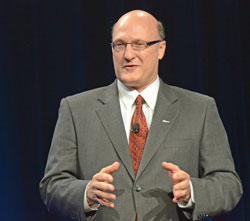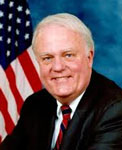The president of the Renewable Fuels Association (RFA) is calling a bill approved by a House subcommittee Tuesday yet another stall tactic to the use of higher ethanol blends in fuel.
 RFA’s Bob Dinneen says the legislation sponsored by Congressman Jim Sensenbrenner (R-WI) injects “parochial politics into the scientifically established process of approving new fuels.”
RFA’s Bob Dinneen says the legislation sponsored by Congressman Jim Sensenbrenner (R-WI) injects “parochial politics into the scientifically established process of approving new fuels.”
“In approving E15, the Department of Energy tested vehicles over millions of driving miles – the equivalent of some 4,700 round trips from Washington to Milwaukee,” said Dinneen in a statement. “To suggest more testing is needed is nothing more than a stall tactic that has but one outcome – our continued addiction to oil.”
Dinneen adds that the concerns raised in the bill are “largely superficial and do not require the intervention of Congress to resolve. America’s ethanol industry has been working with auto companies and fuel suppliers for over a year to address any concerns and misconceptions that persist. This bill would reverse the progress private industry has already achieved and threaten the job creation that would stem from an increased use of domestic renewable fuels.”





 First, the Repowering Assistance Program provides approximately $25 million in funding to biorefineries that have been in existence on or before June 18, 2008. The purpose of the program is to provide a financial incentive to biorefineries to use renewable biomass in place of fossil fuels used to produce heat or power. By providing this assistance, USDA is helping these facilities install new systems that use renewable biomass.
First, the Repowering Assistance Program provides approximately $25 million in funding to biorefineries that have been in existence on or before June 18, 2008. The purpose of the program is to provide a financial incentive to biorefineries to use renewable biomass in place of fossil fuels used to produce heat or power. By providing this assistance, USDA is helping these facilities install new systems that use renewable biomass. The South Dakota-based ethanol producer notes that research indicates its new
The South Dakota-based ethanol producer notes that research indicates its new 


